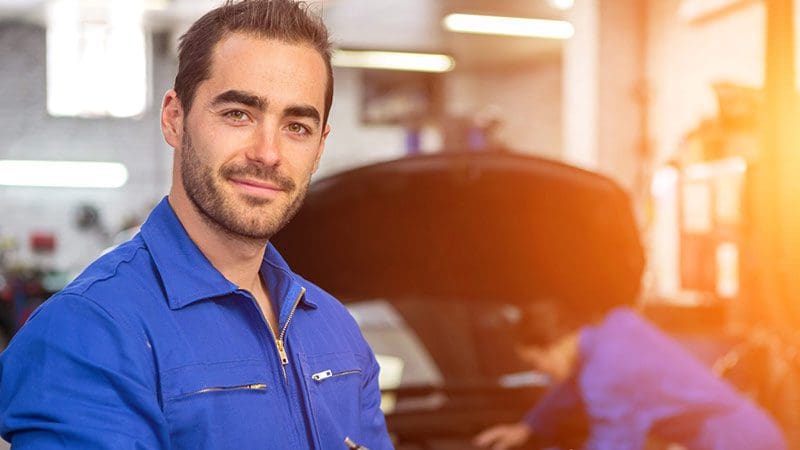 As surprising as this is going to sound, hiring a car stereo professional to work on your car or truck isn’t always easy. OxfordDictionaries.com defines a professional as someone who performs an activity “as a main paid occupation rather than as a pastime.” The limitation of that definition is that getting paid doesn’t mean the person performing that task is properly trained. In this article, we’ll talk about the difference between hiring someone who is paid to do a job and hiring a true mobile electronics expert.
As surprising as this is going to sound, hiring a car stereo professional to work on your car or truck isn’t always easy. OxfordDictionaries.com defines a professional as someone who performs an activity “as a main paid occupation rather than as a pastime.” The limitation of that definition is that getting paid doesn’t mean the person performing that task is properly trained. In this article, we’ll talk about the difference between hiring someone who is paid to do a job and hiring a true mobile electronics expert.
Why Hire a Car Stereo Professional?
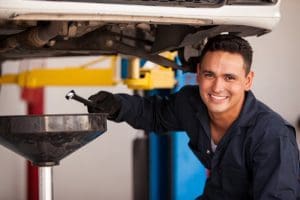 If you are a true handyman (or woman), there likely aren’t many tasks that you can’t complete quite successfully. Speaking for myself, I can handle most any electrical wiring tasks at home; I can build a computer and can diagnose and repair a car audio amplifier. I’ve rebuilt car engines, done brake jobs and replaced suspension components. Recently, I took a welding course simply because I wanted to try my hand at welding.
If you are a true handyman (or woman), there likely aren’t many tasks that you can’t complete quite successfully. Speaking for myself, I can handle most any electrical wiring tasks at home; I can build a computer and can diagnose and repair a car audio amplifier. I’ve rebuilt car engines, done brake jobs and replaced suspension components. Recently, I took a welding course simply because I wanted to try my hand at welding.
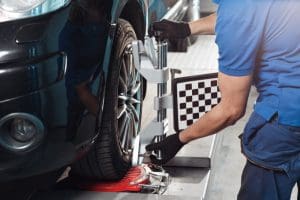 Why do I still hire professionals to work on my car? More often than not, it’s a matter of time management and convenience. If my car needs an oil change, I’d rather pay my friends at Budget Exhaust and Automotive to do it for me while I am at work. I trust them, and I don’t have the hassle of getting rid of the old oil and filter or potentially making a mess in my garage or driveway. In instances where special tools or equipment is required to complete a task like performing a wheel alignment, then we all need to hire a professional. No, the “string and measurements on the garage floor” alignment method isn’t accurate enough.
Why do I still hire professionals to work on my car? More often than not, it’s a matter of time management and convenience. If my car needs an oil change, I’d rather pay my friends at Budget Exhaust and Automotive to do it for me while I am at work. I trust them, and I don’t have the hassle of getting rid of the old oil and filter or potentially making a mess in my garage or driveway. In instances where special tools or equipment is required to complete a task like performing a wheel alignment, then we all need to hire a professional. No, the “string and measurements on the garage floor” alignment method isn’t accurate enough.
The Complexity of Modern Vehicle Electronics
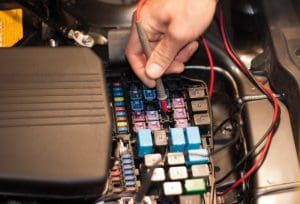 Working on electrical systems in modern cars and trucks is very different than it was 20 years ago. Where once we had simple switches and relays to control lights, door lock actuators and seat heaters, new vehicles use data communication networks like CAN bus to manage modules and sensors all over the car. One wrong slip with a voltmeter or using the wrong type of test probe can easily result in permanent and expensive damage to the computers in the vehicle.
Working on electrical systems in modern cars and trucks is very different than it was 20 years ago. Where once we had simple switches and relays to control lights, door lock actuators and seat heaters, new vehicles use data communication networks like CAN bus to manage modules and sensors all over the car. One wrong slip with a voltmeter or using the wrong type of test probe can easily result in permanent and expensive damage to the computers in the vehicle.
When I was in high school, we had a big plastic board with switches, lights and a flasher relay that emulated the electrical system in a car. Using stackable jumper wires, you could wire up 90 percent of the “vehicle” in about 30 minutes. You can’t do that with modern bus-controlled vehicles and make it work the way you want.
What Do Professional Installers Offer?
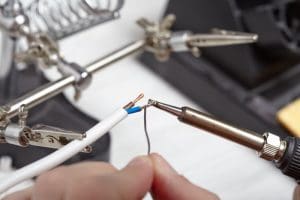 If you have, say, a 1994 Honda Civic, it’s pretty easy to install a new radio: Buy a wire harness adapter and radio from your local car stereo shop, connect the wires color to color and check out YouTube to see how to remove the old radio from your dash – it’s five Phillips-head screws, if I recall correctly. Chances are, if you do your research, you’ll have no issues.
If you have, say, a 1994 Honda Civic, it’s pretty easy to install a new radio: Buy a wire harness adapter and radio from your local car stereo shop, connect the wires color to color and check out YouTube to see how to remove the old radio from your dash – it’s five Phillips-head screws, if I recall correctly. Chances are, if you do your research, you’ll have no issues.
How would a professional do the same task? The way that they make the electrical connections between the wire harness adapter and the radio harness plays a huge role in determining the reliability of the upgrade. Some people twist the wires together and tape the connections. Some will use butt connectors or crimp caps. Some will twist the wires using a mesh splice or a Western Union splice before soldering and wrapping the connection in electrical tape or heat-shrink tubing. They may finish the harness with an automotive-grade cloth or fleece tape to reduce the chances of buzzes or rattles in the dash.
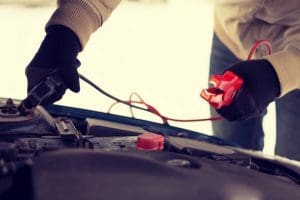 A true professional may put masking tape around the radio opening to keep the trim panel from getting scratched when he or she is working on the car. Seat covers, floor mats, a steering wheel cover and a center console cover can prevent damage. A professional may connect your car to a charger while working on the vehicle with the door open so as not to drain the vehicle battery.
A true professional may put masking tape around the radio opening to keep the trim panel from getting scratched when he or she is working on the car. Seat covers, floor mats, a steering wheel cover and a center console cover can prevent damage. A professional may connect your car to a charger while working on the vehicle with the door open so as not to drain the vehicle battery.
Modern Audio System Upgrades
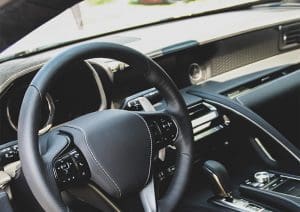 We’ve talked about this before, but it’s worth bringing up again. Top trim-level audio systems from JBL, Bose, Mark Levison or B&O can have as many as 34 speakers in the vehicle, most with dedicated amplifier channels and signal processing. Upgrading these systems is, at the very least, a difficult task and in some cases, a massive engineering undertaking. These challenges are complicated by systems that include active noise-canceling microphones and processors that create virtual engine sounds through the speakers. Audio from Bluetooth hands-free systems, voice-controlled smartphone interfaces and vehicle chimes and warnings may be routed to specific speakers in the vehicle. All of this needs to work perfectly after the audio system upgrade is complete.
We’ve talked about this before, but it’s worth bringing up again. Top trim-level audio systems from JBL, Bose, Mark Levison or B&O can have as many as 34 speakers in the vehicle, most with dedicated amplifier channels and signal processing. Upgrading these systems is, at the very least, a difficult task and in some cases, a massive engineering undertaking. These challenges are complicated by systems that include active noise-canceling microphones and processors that create virtual engine sounds through the speakers. Audio from Bluetooth hands-free systems, voice-controlled smartphone interfaces and vehicle chimes and warnings may be routed to specific speakers in the vehicle. All of this needs to work perfectly after the audio system upgrade is complete.
How Car Audio Integration Experts Upgrade Your Vehicle
 If your car is less than 10 years old, chances are good that some amount of signal processing has been built into the factory radio or amplifier. Upgrading a modern car audio system requires that the installer take a series of measurements of the existing system and perform a series of listening tests to determine if there is an upmixer in the system. Ignoring this information will result in unpredictable and potentially disappointing results.
If your car is less than 10 years old, chances are good that some amount of signal processing has been built into the factory radio or amplifier. Upgrading a modern car audio system requires that the installer take a series of measurements of the existing system and perform a series of listening tests to determine if there is an upmixer in the system. Ignoring this information will result in unpredictable and potentially disappointing results.
This same philosophy applies to upgrading your vehicle with a remote car starter or security system, a radar detector and laser shifter system or even something seemingly simple like adding a dashcam. Knowing how the electronics in your car function before work begins is paramount to ensuring you get the performance and reliability you want from your enhancements.
Are All Car Stereo Installers Professionals?
 By the dictionary definition, if they are getting paid, then that should make them professional, shouldn’t it? Sadly, not everyone is. It takes years or maybe even decades to learn the procedures and processes required to accurately, reliably and safely integrate aftermarket electronics into a new vehicle.
By the dictionary definition, if they are getting paid, then that should make them professional, shouldn’t it? Sadly, not everyone is. It takes years or maybe even decades to learn the procedures and processes required to accurately, reliably and safely integrate aftermarket electronics into a new vehicle.
Depending on the shop you choose, the person working on your car may be paid to complete as many tasks as possible in the least amount of time. On the other side of the coin, the technician may focus on the reliability, serviceability and craftsmanship of the work he or she performs.
When you go shopping for accessories for your vehicle, half of the project is choosing the right electronics and the other half is choosing the right installer. You should ask to see samples of their work that show the wiring and electrical connections behind the scenes. What test equipment do they own? Are they MECP certified? All of this, along with the feeling you get from the salesman, is crucial to ensuring that your vehicle is in safe hands.
Plan Your Mobile Electronics Purchase
When you decide you want to upgrade your vehicle, start by researching the car stereo shops in your area. Look at their reviews on Facebook and Google and check out examples of their work on their Facebook page and website. If you can, contact other clients and look for recommendations in local automotive enthusiast groups. You are hiring someone to work on and potentially modify your vehicle – one of the largest financial investments you own. Don’t take choosing a professional car stereo installer lightly.
